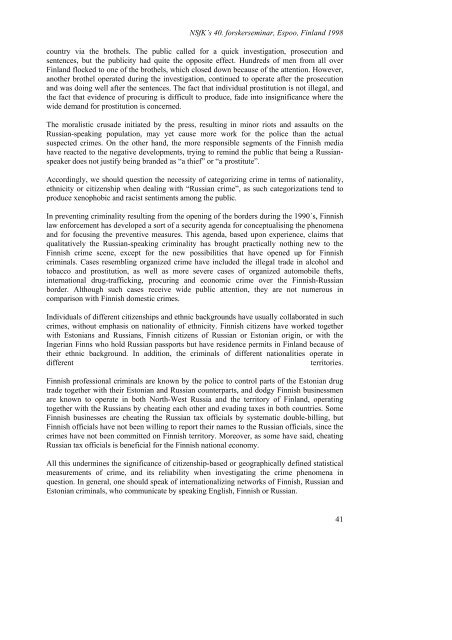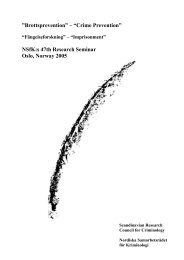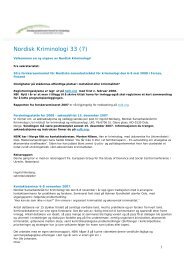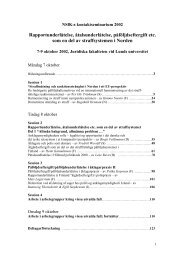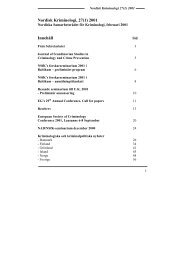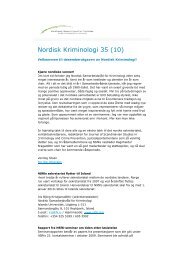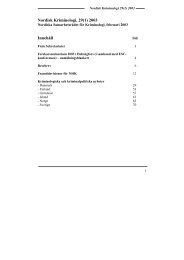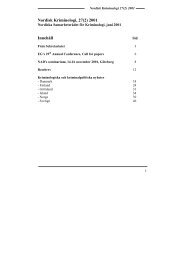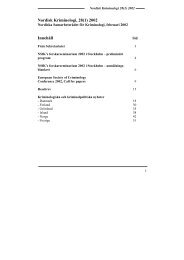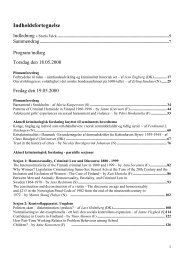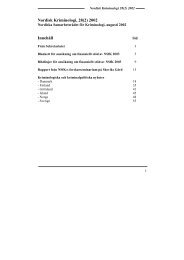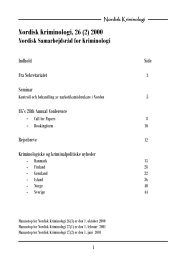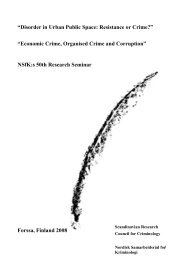Organised Crime & Crime Prevention - what works? - Scandinavian ...
Organised Crime & Crime Prevention - what works? - Scandinavian ...
Organised Crime & Crime Prevention - what works? - Scandinavian ...
Create successful ePaper yourself
Turn your PDF publications into a flip-book with our unique Google optimized e-Paper software.
NSfK’s 40. forskerseminar, Espoo, Finland 1998<br />
country via the brothels. The public called for a quick investigation, prosecution and<br />
sentences, but the publicity had quite the opposite effect. Hundreds of men from all over<br />
Finland flocked to one of the brothels, which closed down because of the attention. However,<br />
another brothel operated during the investigation, continued to operate after the prosecution<br />
and was doing well after the sentences. The fact that individual prostitution is not illegal, and<br />
the fact that evidence of procuring is difficult to produce, fade into insignificance where the<br />
wide demand for prostitution is concerned.<br />
The moralistic crusade initiated by the press, resulting in minor riots and assaults on the<br />
Russian-speaking population, may yet cause more work for the police than the actual<br />
suspected crimes. On the other hand, the more responsible segments of the Finnish media<br />
have reacted to the negative developments, trying to remind the public that being a Russianspeaker<br />
does not justify being branded as “a thief” or “a prostitute”.<br />
Accordingly, we should question the necessity of categorizing crime in terms of nationality,<br />
ethnicity or citizenship when dealing with “Russian crime”, as such categorizations tend to<br />
produce xenophobic and racist sentiments among the public.<br />
In preventing criminality resulting from the opening of the borders during the 1990´s, Finnish<br />
law enforcement has developed a sort of a security agenda for conceptualising the phenomena<br />
and for focusing the preventive measures. This agenda, based upon experience, claims that<br />
qualitatively the Russian-speaking criminality has brought practically nothing new to the<br />
Finnish crime scene, except for the new possibilities that have opened up for Finnish<br />
criminals. Cases resembling organized crime have included the illegal trade in alcohol and<br />
tobacco and prostitution, as well as more severe cases of organized automobile thefts,<br />
international drug-trafficking, procuring and economic crime over the Finnish-Russian<br />
border. Although such cases receive wide public attention, they are not numerous in<br />
comparison with Finnish domestic crimes.<br />
Individuals of different citizenships and ethnic backgrounds have usually collaborated in such<br />
crimes, without emphasis on nationality of ethnicity. Finnish citizens have worked together<br />
with Estonians and Russians, Finnish citizens of Russian or Estonian origin, or with the<br />
Ingerian Finns who hold Russian passports but have residence permits in Finland because of<br />
their ethnic background. In addition, the criminals of different nationalities operate in<br />
different territories.<br />
Finnish professional criminals are known by the police to control parts of the Estonian drug<br />
trade together with their Estonian and Russian counterparts, and dodgy Finnish businessmen<br />
are known to operate in both North-West Russia and the territory of Finland, operating<br />
together with the Russians by cheating each other and evading taxes in both countries. Some<br />
Finnish businesses are cheating the Russian tax officials by systematic double-billing, but<br />
Finnish officials have not been willing to report their names to the Russian officials, since the<br />
crimes have not been committed on Finnish territory. Moreover, as some have said, cheating<br />
Russian tax officials is beneficial for the Finnish national economy.<br />
All this undermines the significance of citizenship-based or geographically defined statistical<br />
measurements of crime, and its reliability when investigating the crime phenomena in<br />
question. In general, one should speak of internationalizing net<strong>works</strong> of Finnish, Russian and<br />
Estonian criminals, who communicate by speaking English, Finnish or Russian.<br />
41


